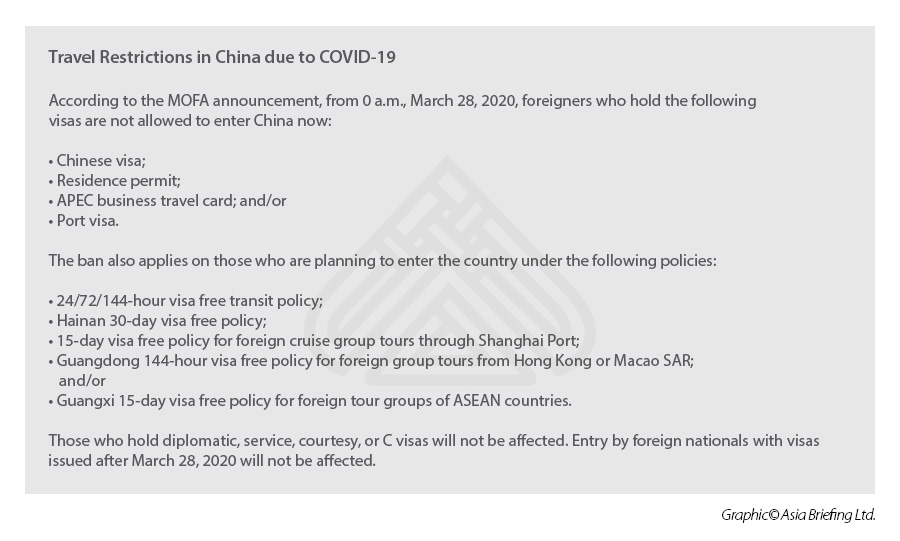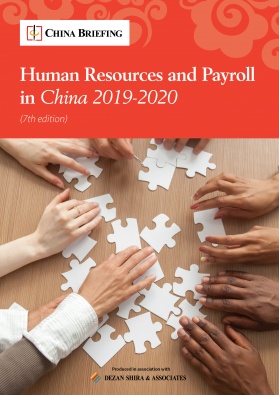Q&A: China’s Travel Ban Policy and Visa Issues for Foreigners
Latest updates
- Breaking News: China will ease entry restrictions for foreigners inoculated with Covid-19 vaccines made in China, according to some Chinese embassies. The said visa facilitation applies only to applicants who have been inoculated with COVID-19 vaccines produced in China (either having received two doses of Chinese-made vaccines with the stipulated gap in between, or having received a single-dose Chinese-made vaccine at least 14 days prior to the application) and obtained the vaccination certificate. The airline boarding requirements by China for Certificates of Negative Nucleic Acid and Anti-Body Blood Tests Results remain unchanged. The new rules in some places have taken effect on March 15, 2021. In addition, according to China’s foreign minister Wang Yi, the country plans to issue international electronic health certificates and implement mutual recognition of other countries’ nucleic acid testing and inoculation, to allow “a healthy, safe, and regulated new order for cross-border exchanges of people.” Read the related article here.
- China has decided to temporarily suspend the entry of non-Chinese nationals again from a series of countries, according to announcements on the official website of their Chinese embassies, including Bangladesh, Belgium, Ethiopia, France, India, Italy, Philippines, Russia, the UK, and Ukraine. Those who will not be allowed entry into China include Chinese visa and/or residence permit holders (for work, personal matters, and reunion), even if they were still valid at the time of the Chinese embassies’ announcements. The respective Chinese Embassy and Consulates will no longer issue Certified Health Declaration Forms for such travelers. However, entry by non-Chinese nationals with visas issued after November 3, 2020 will not be affected by the latest travel ban. Read the related article here.
- Previously, in September, the Ministry of Foreign Affairs and the National Immigration Administration announced that foreign nationals holding valid Chinese residence permits for work, personal matters, and reunion could enter China without applying for new visas – effective from 0 am, September 28, 2020. If these 3 categories of residence permits as held by foreign nationals had expired (in the time since the travel ban was imposed on March 28, 2020) – the holders may apply for relevant visas by presenting the expired residence permits and relevant material to the Chinese embassies or consulates on the condition that the purpose of the holder’s visit to China remains unchanged (see here). All other measures in the March 26 Announcement by the Ministry of Foreign Affairs and the National Immigration Administration on the Temporary Suspension of Entry by Foreign Nationals Holding Valid Chinese Visas or Residence Permits (see here) will continue to be implemented.
- On August 10, 2020, The PRC Embassy in Denmark announced that China is now allowing foreign nationals from 36 European countries to directly apply for new Chinese visas if they meet certain eligibility criteria. Read the related article here.
By Fuki Fu, Human Resources, Dezan Shira & Associates Shanghai Office
On March 26, 2020, the Ministry of Foreign Affairs of the People’s Republic of China (MOFA) announced it will suspend the entry of most foreign nationals into the country from March 28, 2020. Many foreigners holding a residence permit and who work in China are now unable to return. Naturally, the most commonly asked questions are how they would be able to re-enter China and how to manage the status of their visas, work permits, and residence permits.
Dezan Shira & Associates has received many such inquiries on China’s travel ban policy. After checking with the National Immigration Administration and the Border and Customs departments, here we list the frequently asked questions and offer our comments.
Q: If I am holding a valid business visa, may I enter China for urgent business now?
A: The MOFA has suspended the entry into China by foreign nationals holding visas or residence permits since March 28, 2020. If your visa was issued before March 28, you will not be able to enter China with a business visa; if your visa is issued after March 28, you will be free to enter China.
If you are engaged in necessary economic, trade, scientific, and technological activities, you can apply for the special visa with the Invitation Letter issued by the Foreign Affairs Office.
Q: What is the special visa? How long is the validity period?
A: The special visa is officially called “M visa” (purpose of business visit). The visa will be valid for a minimum period of 30 days and a maximum period of 180 days.
Q: If I am stuck outside China and my work permit and residence permit are going to expire before the borders reopen, do I have to reapply for the work permit and residence permit, or do I have to start with the Z visa again?
A: If your work permit and residence permit are going to expire before the travel ban is lifted, you should renew the work permit remotely.
After the travel ban is lifted, you can enter China with any type of visa. When you enter China, you can then go to the Entry and Exit Administrative Department of the Police for the residence permit extension application. There is no need to start with Z visa.
Q: What should I do if the work permit and residence permit expired before the travel ban?
A: If your work permit and residence permit already expired, your Chinese employer will need to restart the work permit application for you. Once the Chinese employer obtains the work permit license (the work permit license is not the final work permit, but for foreign employees outside China to apply for Z visa), you can apply for Z visa in the Chinese Embassy of the country to enter China. After you enter China, your Chinese employer can then continue the work permit application and transfer your Z visa to your residence permit.
Q: If I was terminated by the Chinese employer, but my work permit and residence permit are still valid, may I enter China with the valid residence permit after the travel ban is lifted?
A: No. The company is responsible to cancel the residence permit of the employee after canceling their work permit. If the company did not cancel the residence permit and the foreigner enters China with the residence permit, both the company and the foreigner will be punished for breaking the Rules for the Administration of Employment of Foreigners in China. It will also affect the parties’ other visa and residence permit applications in China.
Q: If I am a foreigner but holding a permanent resident ID card of China, may I enter China under the travel ban?
A: Yes, foreigners who hold permanent residence ID cards can enter China normally.
Q: Do I need to observe a compulsory quarantine of 14 days when landing in China?
A: Yes. Chinese provinces and cities are adopting similar but differentiated quarantine measures to inbound travelers from overseas (the number of days of quarantine varies from region to region, and the quarantine can be carried out at designated places or homes). Besides, nucleic acid tests are compulsory for all overseas passengers entering China by air, sea, or land. For example, when you land or transfer in Shanghai from overseas, you will be subject to a centralized quarantine of 14 days as well as a nucleic acid test. All the related fees will be at your own expense.
Q: Which department will be responsible for announcing new regulations and how can companies find the relevant information easily?
A: New regulations and policies will be published on official WeChat accounts and websites of government departments. You can follow the WeChat account “国家移民管理局” (National Immigration Administration) or visit the NIA’s official website to get information on the latest policies and regulations. Also, you can follow WeChat accounts or websites of the local foreign affairs office to get the information.
For more information or special visa application assistance in China, you are welcome to contact us at China@dezshira.com.
The article was originally published July 3, 2020. It was last updated March 15, 2021 to provide clarity and include new developments.
About Us
China Briefing is written and produced by Dezan Shira & Associates. The practice assists foreign investors into China and has done so since 1992 through offices in Beijing, Tianjin, Dalian, Qingdao, Shanghai, Hangzhou, Ningbo, Suzhou, Guangzhou, Dongguan, Zhongshan, Shenzhen, and Hong Kong. Please contact the firm for assistance in China at china@dezshira.com.
We also maintain offices assisting foreign investors in Vietnam, Indonesia, Singapore, The Philippines, Malaysia, Thailand, United States, and Italy, in addition to our practices in India and Russia and our trade research facilities along the Belt & Road Initiative.
- Previous Article Investing in Suzhou Industrial Park: A Brief Profile
- Next Article Incentives and Favorable Policies Available in Suzhou Industrial Park







